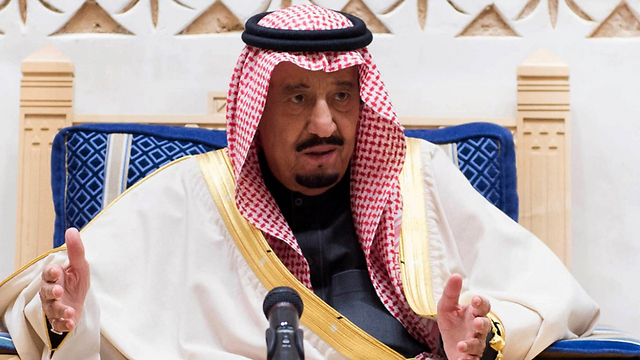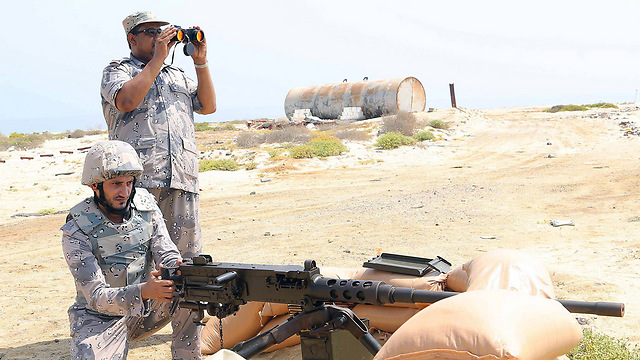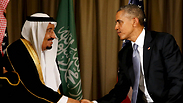
Saudi Arabia's war of independence
Analysis: Their disappointment with Obama has led the Saudis to adopt a sophisticated and aggressive strategy. No longer the world's oil barrel, Riyadh is now using oil prices to remove American companies from the market, punish the Russians for their support of Assad and shatter Iran's hopes of exporting large amounts of oil.
Granted, we should wait and see whether this alliance, whose operational and command center will be based in Riyadh, will actually turn into a functioning and efficient body. But the fact that Saudi Arabia convened on its territory representatives of 33 Muslim countries, Arab and non-Arab, from Asia and from Africa, and reached an agreement and a joint declaration with them on the establishment of a coalition to fight radical Islamic terror can be seen as a diplomatic achievement of global significance.
The coalition's establishment points to Saudi Arabia's unshakable standing as the leader of Islam's moderate Sunni stream and as a regional power. The battle's targets and the alliance's make-up accurately reflect the map of interests of Saudi Arabia and the other Gulf states. That is the reason why Iran was not invited to the Riyadh meeting and why it is not a member of the alliance.
Lebanon, on the other hand, has joined the alliance although most of its citizens are Shiites and despite the fact that Hezbollah is its strongest political and military power, likely due to the fact that Saudi Arabia is still hoping to rescue Lebanon from Iranian hegemony and because Lebanon is suffering from terror attacks carried out by the Islamic State and other Islamist Sunni organizations.
In any event, to avoid any misunderstandings, the young Saudi prince and defense minister, Mohammad bin Salman (the son of King Salman), rushed to clarify in a press conference Tuesday evening that he saw the United States and other Western countries as wanted partners in the battle, and that the new coalition would not only target ISIS and al-Qaeda, but also Hezbollah and other terror organizations.
The active prince, likely the architect of the new alliance, was probably also referring to the Muslim Brotherhood movement, which has been outlawed in Saudi Arabia and in Egypt, and to all the Sunni and Shiite Islamist organizations challenging and attacking the moderate Sunni regimes and the West. Interestingly, Saudi Arabia included the Fatah-led Palestinian Authority in the alliance and left out Hamas in Gaza.
An influential regional player
The announcement of the new coalition should not surprise anyone. Ever since the start of the revolts in the Arab world in December 2010, Saudi Arabia has been establishing its status as a regional power and military leader and a key player in the global economy. In the past few years, the Saudis have dropped the image of the ignorant sheikh sitting on a mountain of petrodollars, with one hand threatening the tap of oil feeding the West and with the other hand resting on Uncle Sam's broad shoulders.
This image was rightfully earned by the Saudis since the global oil crisis in 1973, when they proclaimed an embargo on oil exports to the West and made oil prices skyrocket after the Yom Kippur War. During that period and in the following decades, the paranoid Saudi royal family purchased weapons worth billions from the US, but paid the Palestinian Liberation Organization (PLO) millions to prevent it from carrying out terror attacks against the kingdom. The Saudis also hired two divisions of the Pakistani army which were stationed in Saudi Arabia for years in order to defend the royal family.
No more. Saudi Arabia has now adopted an independent, activist, sophisticated and aggressive regional policy, which wisely uses petrodollars not only to buy property without restraint as it did in the past, but also as a means of pressure and diplomatic temptation which has turned it into the Arab's undisputed leader at this time: Saudi money is funding the Egyptian economy, thereby keeping the al-Sisi regime in power; and the Sudanese ruler, after being invited to a meeting with Prince Mohammad in Saudi Arabia, returned to Khartoum and severed ties with Iran, which lost an important Sunni ally and a route for smuggling weapons to Hamas in Gaza and to Syria.
And that's not all: King Salman and his son Mohammad, the defense minister, are not hesitating to send their ground forces and air force to fight in Yemen while the Iranians - through the Houthis - are threatening the kingdom's southern border and Yemenite President Hadi's Sunni regime. They are also sending two armored brigades to Bahrain, where the Sunni regime is being threatening by the Shiite majority in the population, which is being incited by Iran.
And when ISIS threatens the moderate Sunni regimes and the West, Saudi Arabia does not hesitate to openly join the coalition established by Washington, and Saudi F-15 planes are bombing targets in Syria.
Let down by Obama, again
In the economic area too, the Saudis have stopped playing the role of the developed countries' - and mainly America's - energetic poodle. They are now using the oil price weapon in order to punish Russia for its support of Syrian President Bashar Assad, in order to weaken Iran if and when the sanctions imposed on it are lifted, and mainly in order to remove American oil companies from the saturated market, where oil and gas prices have gone into a free fall.
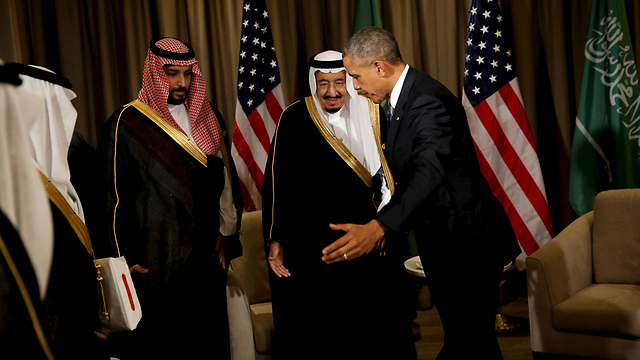
The extreme revolution in the Saudi strategy and conduct did not take place willingly, but was forced on the kingdom following the recognition that if it fails to take care of itself, no one will. The Saudi royal family's main interest is the survival of its regime. That is the compass and supreme interest of national security, which all the efforts of the Saudi regime are focused on. That is also the reason why Saudi Arabia diagnosed Iran's strategic attempt to reach regional hegemony - whether through subversion and terror or by attaining a nuclear weapon - as an almost existential threat.
The Iranian subversion and terror threatened to incite the Shiite majority in northeast Saudi Arabia, and to thereby undermine the stability in the kingdom in the most important oil production area; the introduction of the Shiite Houthis in Yemen is already allowing Iran to threaten Saudi Arabia's southern border; obtaining a nuclear weapon will allow Iran to threaten not only the Sunni Gulf states' oil and gas fields, but also to dictate to all of the region's countries - including Saudi Arabia - the Iranian policy on energy exports, the relationship with the West and even the attitude towards the Shiite minority which Iran wishes to please.
The Iranian effort to reach hegemony is rightfully perceived in Saudi Arabia as an attempt to "right the wrong" suffered by the Shiites in the 7th century and to restore their leadership in the Muslim world, at the expense of Saudi Arabia, the leader of the Sunni stream. That is also the reason why Saudi Arabia is helping the rebels who are fighting to bring down Assad's Alawite (Shiite) regime, while fighting ISIS which is threatening the survival of the "corrupt and heretic" Saudi royal family.
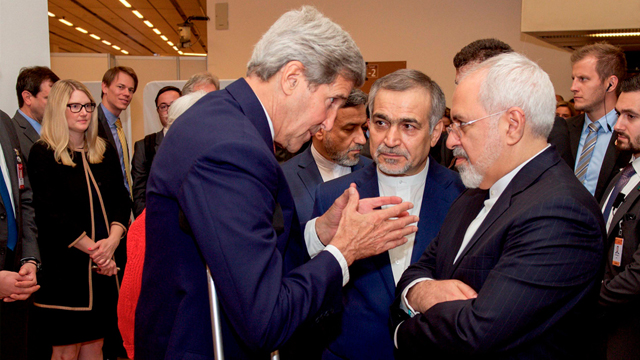
In light of the cluster of threats from the Iran-led Shiite radical axis, Saudi Arabia hoped in early 2011 to rely on its ally and protector - the US. But the Obama administration let the Saudis down wherever its intervention was required: It let them down when US soldiers withdrew from Iraq and left the Sunnis in the western part of the country at the mercy of Shiite prime minister, Nouri al-Maliki, who excluded them from the government and deprived them of economic benefits; and it let them down in Syria when the US president avoided helping the Sunni rebels (who were supported by Saudi Arabia) to topple the Assad regime, even when it made use of chemical weapons.
But the biggest sin, as far as the Saudis are concerned, was the nuclear agreement with Iran, which will allow the Shiite ayatollahs to possess a nuclear weapon in 15 years at the latest and threaten the royal family with it. There is no doubt that the disappointment with Washington was the main reason why the Saudis decided to take their fate and the fate of the Sunni regimes in their own hands.
Barrel price war against the Americans
Saudi Arabia, very soberly, is not launching the battle against Iran on its own. The Saudis understand that in order to create effective international action against subversion, terror and a military nuclear project, they need legitimacy and international cooperation. Without that, they have no chance of reaching a real achievement. So once King Salman despaired of Obama, he learned from Presidents Bush Sr. and Jr. and began creating alliances with the other Gulf states, and now with a wide coalition of Muslim countries across Asia and Africa.
A second rule the Saudis are exercising is discretion, tact and playing cool. Although he is angry at the Americans, King Salman is not publicly confronting Obama. He is letting all kinds of "former" officials relay the message. Outwardly, he is supporting the move and receiving compensation for the nuclear agreement from the administration in Washington in the form of an arms deal worth hundreds of millions of dollars, which is not preventing the Saudis from seriously harming the American economy's stability as they wage an all-out war to maintain their share in the global oil market.
The Syrian motive in this area too is the royal family's survival. Most of its income comes from the oil and gas field, and the Saudi regime is using them to generously fund its residents' needs and standard of living. The jump in America's energy production, and the energy independence the US is quickly approaching, are threatening in the long run to eat up the huge reserve of petrodollars (about 400 billion) with which the regime in Riyadh is buying social calm and stability in the international arena, and allies in the regional arena.
The oil price policy led by Saudi Arabia as part of OPEC (Organization of the Petroleum Exporting Countries) is therefore also driven by survival considerations. The oil market is currently flooded with supply, mainly due to the new production methods used in the US (fracking), the increased Iraqi oil production and the expectation that Iran will re-enter the global oil market with production of millions of barrels a day, the moment the sanctions are lifted.
The situation is aggravated and the prices are being pushed down even more because of the drop in demand, mainly on the part of the Chinese economy, which is in the midst of a slowdown. As a result, oil prices have dropped by as much as 40 percent since June.
In such a situation, the required step on the part of the OPEC companies would be to reduce the production quotas, create a shortage in the global market and make oil prices increase. But in the latest OPEC conference in November, following Saudi pressure, the production remained unchanged and the price per barrel dropped even more. Today, the average price of an oil barrel in the global market is around $36.
With such prices, the profitability of producing and exporting oil largely depends on the cost of production - in other words, how much does it cost to extract oil from the geological layers it is trapped in and pump it to the ground. The cost of producing an oil barrel in Saudi Arabia and in the other Gulf countries is the lowest in the world, about $30 per barrel. At such a price, the Saudis barely make a profit. But the average cost of producing an oil barrel in the US is $50-70 per barrel. So many American companies which have entered the oil market with the new production methods are now being forced to stop investing, causing a slowdown in the entire American economy.
The Saudis have got what they wanted: They are removing the competing American oil companies from the market and reducing oil prices. Suffocating the competitor through a temporary price reduction (dumping) is the name of the tough and unsentimental game Saudi Arabia is now playing against its American ally.
This game is also affecting Russia and Iran, and mainly Venezuela, where the oil barrel production cost is much higher than in Saudi Arabia, which also has the largest oil reserves in the world. Punishing Russia for helping Assad and weakening Iran are clearly not just a commercial interest but also a strategic interest of the manipulative desert kingdom.
The Israeli connection
In light of all this, it's clear why Prime Minister Benjamin Netanyahu and most of the opposition leaders in Israel are allegedly pinning their hopes on a relationship and even an alliance with the Saudis - both because we have shared interests in the war against Iran's hegemony ambitions and nuclear program and because we have a shared interest to fight radical Islamic terror. Israel has a lot to contribute in both areas, and we also need the international and Muslim legitimacy which Saudi Arabia can offer us.There are even those toying with the idea that Saudi Arabia, as part of the peace initiative it came up with in 2000, will sponsor and encourage a permanent agreement to end the Israeli-Palestinian conflict. It would be reasonable to assume that they would be willing to turn a blind eye if Israel ever decides to strike in Iran.
But the Saudis are unprepared at the moment and will be unprepared in the future to sustain a real and open relationship and full cooperation with Israel as long as there is no agreement with the Palestinians. A Saudi-sponsored peace conference? No problem, different Saudi dignitaries are telling the Israelis they talk to, but it must be clear that in such a conference Saudi Arabia will support the Palestinian core demands and fall into line with them when it comes to the right of return, borders and security issues.
There is no cautious Saudi leader who will take the risk of being denounced as a traitor by Hamas or ISIS. So unfortunately, the idea of reaching a two-state solution with the Palestinians which will be sponsored by the increasingly stronger Saudi power is nothing more than an optical illusion. Once an agreement is reached, Saudi Arabia will welcome it and will be willing to normalize its relations with us and fund the agreement. But as long as ISIS is around, Saudi Arabia will not serve as a decent mediator between Israel and the Palestinians.











